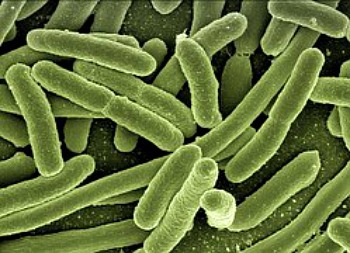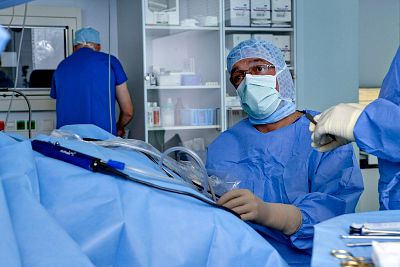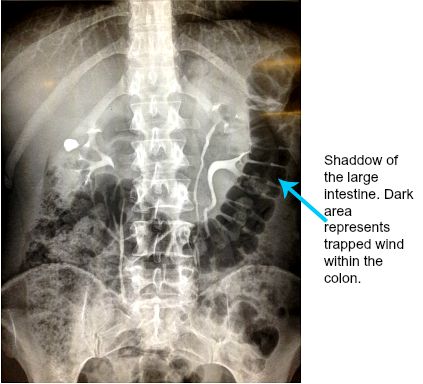Trapped Wind
Causes, Diagnosis & Treatment Of Trapped Wind
What Is Trapped Wind?
Trapped wind is a common cause of abdominal pain, discomfort and bloating.
We all generate about 500 to 2000ml of gas or wind every single day. Most of this gas comes from the air we swallow during eating or talking or chewing.
The remainder comes from intestinal gas produced by normal bacteria that live within our bowels, as a by-product of their digestive activity.
Most of this gas is expelled from our body when we belch or pass wind or flatus, leaving 200 to 300ml inside our bowels, at any
given time.
A number of conditions or situations could lead to the accumulation and retention of larger amounts of gas in our intestines, causing excessive belching, bloating, abdominal pain or discomfort and passing of large amount of flatus. When larger than normal amount of gas is caught up within our gut, it is referred to as trapped wind or trapped intestinal gas.
Contrary to belief, trapped wind is very common. It is a frequent cause of moderate to severe abdominal pain in babies, older children and adults. But why do people develop trapped intestinal gas and what are the common causes of this condition?
Common Causes of Trapped Wind
Have you ever rushed a meal?
 Picture of bacteria colony: Trapped Wind is mainly caused by swallowed air, bacterial production of gas in our large bowels, or gas remaining inside us after a minimally invasive surgery.
Picture of bacteria colony: Trapped Wind is mainly caused by swallowed air, bacterial production of gas in our large bowels, or gas remaining inside us after a minimally invasive surgery.Maybe it's been a very busy day at work and you decided to dash down the staff room, gulped down a sandwich, then washed it down quickly with a can of soda and ten minutes later you develop a severe pain and bloating in your abdomen!
Or do you chew gum and found yourself doing so for most of the day and later developed bloating and rumbling noise in your stomach?
Are you a new mother trying to understand why your baby has been experiencing lots of colic recently? Did you increase the teat size of his or her feeding bottle to allow more milk run through faster as his or her appetite increased?
Did you notice that you seems to pass a lot of flatus after having beans or vegetables like broccoli and cabbage or plenty of onion?
Yes. Certain foods, behaviours and medical conditions can cause any one of us to accumulate inordinate amount of wind in our gut, leading to trapped wind. The following are the most common causes of this problem. They include:
1. Air Swallowing or Aerophagia
Air swallowing has been recognised as the most common cause of trapped intestinal gas.
We see this more in:
- Bottle-fed newborn babies. When a baby sucks from a bottle and feeds very fast and hurriedly, it tends to pull more air in with the feed. This leads to an accumulation and trapping of air in their very narrow intestines and the bigger the teat the more air is sucked in, leading to aerophagia. This is a condition which causes a baby to cry and wriggle or arch their back after feeding. The can be relieved by "winding" the baby, putting them on their belly, supported on your knee or shoulder and gently but firmly rubbing down on the back until they belch and expel wind.
- People who chew a lot of gum. People who chew gum excessively tend to swallow more than normal amounts of air. If this air is not passed down to the bowels, it can become trapped and cause abdominal discomfort and pain as well as bloating and rumbling noise in the abdomen. If you tend to develop a lot of trapped wind, reducing your gum chewing might be the solution you've been looking for.
- People who drink a lot of fizzy drinks or soda (pop). It is estimated that a can of soda contains about 355ml of carbon dioxide gas. If you drink a can or bottle of fizzy drink quickly, most of this gas gets trapped in your oesophagus or chest causing a lot of burping. If you were to drink more than one can quickly and you have been talking for some time, you could easily have more than 1000ml of gas trapped inside your gut. Thankfully, most of this trapped gas gets passed out. If for any reason you are unable to efficiently pass the gas out, it could lead to abdominal pain, bloating and wind.
- People who have been engaged in a prolonged talking session. Some teachers or speakers find that after a long speech or lecture they develop abdominal discomfort and bloating. This could be due to swallowed gas, taken in between sentences as they speak. Being very anxious during a talk can also lead to air swallowing and trapped wind.
2. High Gas Producing Food
You may notice that having certain kind of food gives you more wind and flatulence.
When we eat, most of the food we take in gets digested or broken down by chemicals in our gut called enzymes.
The part of our meal that can't be digested by our own enzymes pass down the large bowels or colon. The colon contains billions of normal gut bacteria which help break down some of the indigestible material in our meal and this releases a fair amount of gas in the process.
If your meal contains food items that your gut finds hard to digest it could lead to the production of large amounts of gas in your colon causing abdominal bloating, cramps and flatulence. These food items could also draw water into the colon leading to diarrhoea or constipation.
Food items that can cause bloating and trapped wind are referred to high FodMap food items. This is because they are very rich in fructose and oligo-saccharides that "draws" a lot of water into our gut. These high FodMap containing food items include:
- Beans
- Broccoli
- Onions
- Cabbage
- Cauliflower
- Soy beans
- Apples
- Custard
- Wheat, barley, rye
- Processed food rich in corn syrup
- Dairy (lactose) rich foods like ice cream, yogurt, cheese
- Gums and sugar free candies containing mannitol and sorbitol.
If you tend to feel bloated after eating certain kind of food, take a look at the list of foods with high Fermentable Oligo-Di-Monosaccharides and Polyols also known as "High FODMAPs" for short, that causes bloating, constipation, diarrhoea, nausea and flatulence.
3. Trapped Gas In The Abdomen After Minimally Invasive Surgery
Gallbladder surgery, appendectomy, laparoscopy for endometriosis,
ovarian cyst, hysterectomy,
 Gas insufflation during "keyhole" surgery is a new cause of trapped wind for days after an operation.
Gas insufflation during "keyhole" surgery is a new cause of trapped wind for days after an operation.adhesion surgery and other surgical operations on the abdomen are done these days using minimally invasive surgery, also called keyhole surgery.
A naturally occurring gas, carbon-dioxide (CO2) is often "pumped" into the abdominal cavity to help widen the operating space for ease of surgery. Anything between 4 to 6 litres per minute of CO2 is added until the desired pressure required inside the abdomen is achieved.
A further 200ml to 400ml is pumped inside per minute for as long as the surgery lasts to maintain the required pressure and replace the small amounts of gas that leaks out as the surgeon operates.
After the surgery, a large amount of this gas is let out. However, about a third of the gas remains inside the abdominal cavity. This "trapped wind" over time is absorbed into the blood and released outside the body through the lungs. Until then, this trapped gas from surgery can cause symptoms and discomfort including:
- Bloating
- Nausea
- Excessive belching or burping
- Shoulder tip pain
- Shortness of breath. If you feel short of breath after a keyhole surgery, it is best you consult your surgeon immediately and not attribute it to trapped gas only. There are other causes of shortness of breath after surgery that can be serious.
You can read more about complications of laparoscopic surgery and trapped wind after surgery here.
4. Certain Medical Conditions
The causes of trapped wind discussed above usually resolve once the offending cause is removed. If you find yourself continuously feeling bloated, suffer with abdominal cramps and back pain or passing wind excessively, you may need to be assessed for the following conditions that mimic trapped wind:
- Feeling of trapped gas in the upper and lower abdomen during menstrual period due to the slowing effect of your female hormones on your bowels
- Irritable bowel syndrome
- Celiac disease
- Chronic pancreatic dysfunction
- Mal-absorption syndrome
- Chronic constipation
- Subacute intestinal obstruction - this can be caused by adhesions
- Volvulus
- Severe anxiety with aerophagia
- Ovarian cancer in women over 50 years of age with abdominal bloating, pain and weight loss.
5. Putting On Tight Fitting Clothes
A number of people developed trapped intestinal wind caused by putting on tight fitting clothes.
If you were to put on a tight fitting trouser or pant, it can exert enough pressure on your abdomen and press on your bowels, thus obstructing the normal flow of air down your gut, leading to trapped wind.
If you have tried eliminating all the above causes of trapped gas in you and still suffer with the symptoms, then putting on non-tight fitting clothes may help.
Diagnosis of Trapped Wind
The diagnosis of trapped intestinal wind or gas can be made from a good data gathering and physical examination.
Gas could accumulate and be trapped in the upper abdomen, right or left lower abdomen or central abdomen depending on what is causing it.
The following are symptoms of trapped gas and what might be causing it:
- Pain and bloating in the left lower abdomen and passing of wind. This is a common symptom of trapped wind from constipation or irritable bowel syndrome, or consumption of foods high in FODMAPs.
- Trapped gas in the "chest" and feeling bloated in your upper abdomen and lower chest accompanied with belching excessively. This is not uncommon after swallowing air, drinking fizzy drinks or if you have severe anxiety. This trapped wind is in the oesophagus and stomach.
- Pain and bloating in the left upper abdomen shortly after eating could occur after a hurried meal. This pain could be severe and can move around the abdomen as the body tries to eliminate it. When it is passed out by farting (if you can) you get instant relief.
- Intestinal obstruction (acute or sub-acute) can cause severe cramping pain, abdominal distention, nausea and actual vomiting. It often leads to the non-passage of faeces or even flatulence in the case of complete obstruction. If you have any of these symptoms with worsening pain, you must get urgent medical attention to exclude intestinal obstruction.
How To Treat or Relieve Trapped Gas
The treatment for trapped wind depends on what might be causing it.
If you suffer with bloating and trapped stomach or intestinal gas after meals, your best approach would be to:
- Take a look at your food intake to see if your troubles are caused by high FODMAPs containing meals. Take a look at the FODMAPs list here and go on a Low FODMAPs Diet.
- Start taking digestive enzymes with your meals to help improve your digestion. Bean-zyme Anti-Gas Digestive Aid, Food Enzyme Dietary Supplement is a well-studied and trusted digestive enzyme supplement.
If you have trapped wind after surgery, you can use:
- Peppermint capsules. Heather's Tummy Tamers Peppermint Oil Capsules for IBS. These can be used for excessive bloating associated with IBS too.
References
- Management of Patients With Intestinal And Rectal Disorders. Brunner & Suddarth's Textbook of Medical-surgical Nursing, Volume 1. Edited by Suzanne C. O'Connell Smeltzer, Brenda G. Bare, Janice L. Hinkle, Kerry H. Cheever. 2010. Page 1097.




